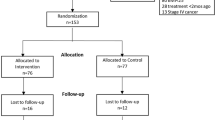Little research has been undertaken to determine why healthy people agree to enroll in randomized controlled trials of cancer prevention. This study describes the beliefs of Canadian women participating in a trial designed to determine the effect of reducing dietary fat on the development of breast cancer. Healthier eating, nutritional counseling, contributing to science, and helping others were the most frequently cited advantages of participation. Weight control and general better health were specifically associated with the dietary regimens. Attending appointments and difficulties when eating out were the main disadvantages of participation. Suggestions that would promote adherence to the trial protocol also were elicited. Responses cited most often included opportunities to meet other participants, more nutritional counseling (particularly psychological tips), updates about the trial, and more recipes. Attention should be paid to these suggestions as they characterize some of the major determinants of adherence behavior.
Similar content being viewed by others
References
Boring CC, Squires TS, Tong T. Cancer statistics, 1993. CA Cancer J Clin 1993; 43: 7–26.
Boyd NF, Cousins M, Lockwood G, Tritchler D. Dietary fat and breast cancer risk: the feasibility of a clinical trial of breast cancer prevention. Lipids 1992; 27: 821–6.
Prentice RL, Sheppard L. Dietary fat and cancer: consistency of the epidemiologic data, and disease prevention that may follow from a practical reduction in fat consumption. Cancer Causes Control 1990; 1: 81–97.
Willett WC. Epidemiologic studies of diet and cancer. Med Oncol Tumour Pharmacother 1990; 7(2–3): 93–7.
Schatzkin A, Greenwald P, Byar DP, Clifford C. The dietary fat—breast cancer hypothesis is alive. JAMA 1989; 261: 3284–7.
Goodwin P, Boyd NF. Critical appraisal of the evidence that dietary fat intake is related to breast cancer risk in humans. JNCI 1987; 79: 473–85.
Cohen LA. Diet and cancer. Sci Am 1987; 257: 42–8.
Health and Welfare, Canada. Canada's Food Guide. Ottawa: Minister of Supply and Services, Canada, 1982.
Ho EE, Atwood JR, MeyskensJr FL. Methodological Development of Dietary Fiber Intervention to Lower Colon Cancer Risk. Advances in Cancer Control: the War on Cancer—15 Years of Progress. New York: Alan R. Liss, 1987: 263–81.
Gotay CC. Accrual to cancer clinical trials: directions from the research literature. Soc Sci Med 1991; 33: 569–77.
Rimer BK. Participant enrollment, participation, and compliance in chemoprevention trials. Adv Exp Med Biol 1992; 320: 111–7.
Mattson ME, Curb JD, McArdle R, and the AMIS and BHAT Research Groups. Participation in a clinical trial: the patients' point of view. Cont Clin Trials 1985; 6: 156–67.
Goodman NW, Black AMS. Refusal rates for clinical trials. Br J Anaes 1986; 58: 938–9.
Arnold A, Johnstone B, Stoskopf B, et al. Recruitment for an efficacy study in chemoprevention—the concerned smoker study. Prev Med 1989; 18: 700–10.
Dermatis H, Rowland J, Miransky J, Kerner J, Osborne M, Holland J. Consent and compliance in chemoprevention trials. In: Proceedings: The First International Breast Cancer Chemoprevention Workshop. New York, November 20, 1987. New York: Marcel Dekker, 1988; 633–5.
Cassileth BR, Lusk EJ, Miller DS, Hurwitz S. Attitudes toward clinical trials among patients and the public. JAMA 1982; 248: 968–70.
Saurbrey N, Jensen J, Rasmussen PE, Gjorup T, Guldager H, Riis P. Danish patients' attitudes to scientificethical questions. Acta Med Scand 1984; 215: 99–104.
Shepherd R, Stockley L. Nutrition knowledge, attitudes, and fat consumption. J Am Diet Assoc 1987; 87: 615–9.
Fischer CA, Crockett SJ, Heller KE, Skauge LH. Nutrition knowledge, attitudes, and practices of older and younger elderly in rural areas. J Am Diet Assoc 1991; 91: 1398–401.
Lockington TJ, Powles S, Meadows KA, Wise PH. Attitudes, knowledge and blood glucose control. Diabetic Med 1989; 6: 309–13.
Glanz K, Brekke M, Hoffman E, Admire J, McComas K, Mullis R. Patient reactions to nutritional education for cholesterol reduction. Am J Prev Med 1990; 6: 311–7.
Mettlin C, Cummings KM, Walsh D. Risk factor and behavioral correlates of willingness to participate in cancer prevention trials. Nutr Cancer 1985; 7: 189–98.
Stevens M, Greenberg ER, Baron JA. Practical aspects of cancer prevention trials. In: Moon TE, Micozzi MS, eds. Nutrition and Cancer Prevention—Investigating the Role of Micronutrients. New York: Marcel Dekker, 1989: 513–32.
Becker MH. The health belief model and personal health behavior. Health Educ Monographs 1974; 2: 326–473.
Ajzen KI, Fishbein M. Understanding Attitudes and Predicting Social Behavior. Englewood Cliffs, NJ: Prentice-Hall, 1980.
Dillman DA. Mail and Telephone Surveys: the Total Design Method. New York: Wiley, 1978.
Woudenberg F. An evaluation of Delphi. Technolog Forecasting Soc Change 1991; 40: 131–50.
Urban N, White E, Anderson GL, Curry S, Kristal AR. Correlates of maintenance of a low-fat diet among women in the Women's Health Trial. Prev Med 1992; 21: 279–91.
Glanz K. Compliance with dietary regimens: its magnitude, measurement, and determinants. Prev Med 1980; 9: 787–804.
Additional information
Drs Till and Boyd, and Mss Sutherland, Martin, and Greenberg are with the Division of Epidemiology & Statistics, Ontario Cancer Institute/Princess Margaret Hospital, Toronto, Canada. Ms Carlin and Mr Harper were summer students in the Division. Address correspondence to Ms Sutherland, Division of Epidemiology and Statistics, Ontario Cancer Institute, 500 Sherbourne Street, Toronto, Canada, M4X 1K9. This research was supported by The National Cancer Institute of Canada with funds from the Canadian Cancer Society. Dr Boyd is the recipient of a National Health Scientist award from Health and Welfare, Canada.
Rights and permissions
About this article
Cite this article
Sutherland, H.J., Carlin, K., Harper, W. et al. A study of diet and breast cancer prevention in Canada: why healthy women participate in controlled trials. Cancer Causes Control 4, 521–528 (1993). https://doi.org/10.1007/BF00052427
Received:
Accepted:
Issue Date:
DOI: https://doi.org/10.1007/BF00052427




